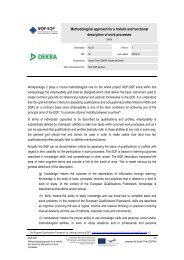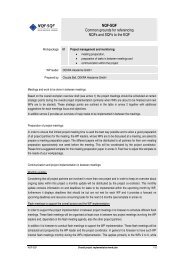Overview of National Qualification frameworks - Project-Nqf-Sqf
Overview of National Qualification frameworks - Project-Nqf-Sqf
Overview of National Qualification frameworks - Project-Nqf-Sqf
Create successful ePaper yourself
Turn your PDF publications into a flip-book with our unique Google optimized e-Paper software.
In March 2009, the General Directorate for VET <strong>of</strong> the Federal Ministry <strong>of</strong> Education, Arts and Culturestarted a project on “curriculum design – learning outcomes orientation” which aims to integrateeducational standards in VET curricula.In apprenticeship (dual system), the training regulation is issued for each pr<strong>of</strong>ile by the Federal Ministry<strong>of</strong> Economics. It consists <strong>of</strong> the occupational competence pr<strong>of</strong>ile (Berufspr<strong>of</strong>il) with related activitiesand work descriptions, and job pr<strong>of</strong>ile (Berufsbild) with knowledge and skills to be acquired byapprentices. The Lehrabschlussprüfung (final apprenticeship examination) is to assess whether thecandidate has acquired the necessary skills and competences for entry to qualified work. It comprises atheoretical and a practical test. Master craftsperson examinations (for manual trade vocations) andexaminations to prove the respective competence (for other regulated trades) are organised by theeconomic chambers in the Länder.In higher education a qualification pr<strong>of</strong>ile, describing the expected learning outcomes (and definitions<strong>of</strong> learning outcomes) for each module, was introduced by the University Act (Universitätsgesetz) in2002, but implementation differs between HE institutions. Universities <strong>of</strong> Applied Science <strong>of</strong>fer practiceoriented HE and are more oriented towards learning outcomes but have not implemented the approachsystematically – a project has been commissioned to strengthen learning outcomes orientation in thisarea.__ Are the same descriptors used for all qualifications/sectors?Bachelor-, Master- and PhD-degrees will be classified on the basis <strong>of</strong> the Dublin descriptors, whilequalifications outside the Bologna architecture will follow the NQF descriptors:__ Define the NQF’s typology: Does it have a focus on coordinating the existing system (transparency,coherence), a focus on regulating the existing system (quality, accountability) or a focus ontransforming system (new standards and new provision)?The Austrian NQF will focus on transparency (<strong>of</strong> the qualifications system) and orientation and will notbe an instrument <strong>of</strong> regulation. This means that there will be no entitlements linked with a levelclassification <strong>of</strong> a qualification – neither in terms <strong>of</strong> access to qualifications placed on higher levels, norin terms <strong>of</strong> salary classification.__ Are there already revisions <strong>of</strong> the NQF planned?In Austria, the NQF development is still work in progress. Currently, the definition <strong>of</strong> criteria for theNQF classification, <strong>of</strong> the classification procedure and the NQF governance structure are beingdeveloped. The results <strong>of</strong> this work will enter into an NQF Manual. This Manual will provide supportthroughout the entire NQF classification process. Moreover, it will also give information on the mainactors/bodies involved in NQF matters (governance structure) and stipulate their tasks.




